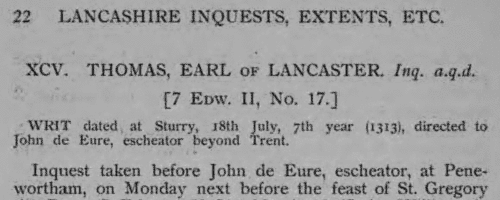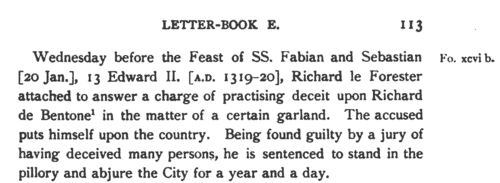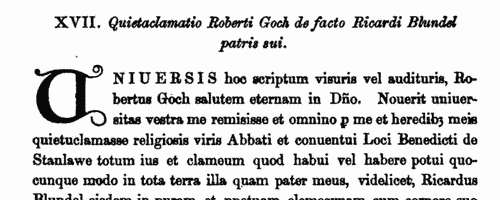Buri Surname Ancestry ResultsOur indexes 1000-1999 include entries for the spelling 'buri'. In the period you have requested, we have the following 11 records (displaying 1 to 10): Buy all | | | Get all 11 records to view, to save and print for £46.00 |
These sample scans are from the original record. You will get scans of the full pages or articles where the surname you searched for has been found. Your web browser may prevent the sample windows from opening; in this case please change your browser settings to allow pop-up windows from this site. Lancashire Assizes
(1202-1285)
All the surviving records of the assizes held by the royal justices in eyre (itinerant) in Lancashire during this period were extracted by colonel John Parker and published by the Lancashire and Cheshire Record Society from 1904. The justices not only tried all civil actions outstanding on their advent, pleas of the crown and common pleas, but also interrogated the juries of each wapentake and borough as to the Capitula Itineries, the Articles of the Eyre, inquiring into the king's proprietary rights, escheats, wardships, and questions of maladministration. Only a dozen complete rolls survive for this period; but Appendix I (pp. 218-253) gathers together from the Patent Rolls of the reign of Henry III (1216-1272) a schedule of Lancashire assizes for which justices were assigned; and Appendix II (306-342) adds the fines and amercements before the justices during that reign, as recorded on the Pipe Rolls.BURI. Cost: £4.00.  | Sample scan, click to enlarge

| Chancery Warrants
(1244-1326)
Warrants were issued by the kings of England to the royal chancery: most of these warrants led to further proceedings which are recorded on the Charter Rolls, Patent Rolls, Fine Rolls, Close Rolls or the Inquisitions: but archivists have identified a large number of warrants for which there are no such equivalent records, and those for the reigns of Edward I and Edward II are gathered here. Most of the entries relate to England and Wales, but with occasional items referring to Ireland and the English possessions in France.BURI. Cost: £4.00.  | Sample scan, click to enlarge

| Lancashire landowners and their tenants
(1310-1333)
This compilation of abstracts of Lancashire inquisitions, extents (surveys) and feudal aids (taxes) was prepared for the Lancashire and Cheshire Record Society and printed in 1907, from originals in the national archives of the Public Record Office. Almost all the material has been translated from the original abbreviated Latin: where surnames have been Anglicized, the original is shown in italics, as with the word 'faber' in the sample scan. BURI. Cost: £6.00.  | Sample scan, click to enlarge

| Inhabitants of London
(1314-1337)
Letter Book E of the City of London contains enrolments of recognizances between inhabitants, particularly citizens, for sums of money lent or due; grants of pieces of land or property; and various records relating to the city administration, minor infractions, &c.
BURI. Cost: £4.00.  | Sample scan, click to enlarge

| Clergy, the religious and the faithful in Britain and Ireland
(1305-1342)
These are abstracts of the entries relating to Great Britain and Ireland from the Regesta of popes Clement V, John XXII and Benedict XII. Many of these entries relate to clerical appointments and disputes, but there are also indults to devout laymen and women for portable altars, remission of sins, &c. This source is particularly valuable for Ireland, for which many of the key government records of this period are lost. Clement V was consecrated and crowned 14 November 1305 (the day from which his pontificate is dated); John XXII was crowned 5 September 1316; Benedict XII 8 January 1335 and died 25 April 1342. From 1309 onwards the papacy was in exile at Avignon. The extracts were made by W. H. Bliss from Regesta lii to cxxxvi, and published in 1895. Bliss remarked that 'although the writing of the Papal Registers of the 14th century is clearer than that of many contemporary English MSS., the entries in them were for the most part founded upon petitions or letters from different countries, and the scribes in the Papal Chancery must have experienced even greater difficulty in copying English proper names than English students experience nowadays in reading the early Chancery Rolls preserved in the Public Record Office. Not having local or personal knowledge, they constantly misread doubtful letters.'BURI. Cost: £4.00.  | Sample scan, click to enlarge

| Lancashire and Cheshire tenants, patrons and friends of Whalley abbey
(1178-1350)
About to leave for the Holy Land in 1178, John, constable of Chester, founded an abbey at Stanlawe (Stanlow) in Cheshire, endowing it with the townships of Staneye (Stanney) and Aston. Inundated by the sea at Stanlow, the monastery was removed to Whalley in Lancashire in 1294, and this foundation of Cistercians (grey monks) became one of the wealthiest in northern England. It received grants of lands in Ince, Garston, Childewall, Aykebergh, Little Woolton and Warrington in southwest Lancashire; Eccles, Barton, Maunton, Swynton, Pendleton, Worsley, Hulton, Westhalghton, Rumworth, Pendlebury, Cadishead and Denton in the south; Spotland, Chadwick, Castleton, Marland, Todmorden, Rochdale, Whitworth, Heley, Falenge, Chaderton, Wardle, Howarth and Saddleworth in the east; Wytton, Derwent, Plesyngton, Balderston, Salebury, Read, Downham, Clithero, Ribchester, Withnall, Wheelton and Stanworth in Blackburn hundred; and Warton, Carleton, Steyninges, Elswick and Preston in Amounderness hundred; as well as further property in Cheshire, in Chester, Nantwich, Northwich, Aston, Backford, Walton and Wynlaton. A careful copy of all these grants was compiled in the 14th century in what is called the Coucher Book or C(h)artulary of Whalley Abbey. The evidence had been carefully sorted and collated in twenty chapters or titles, each containing a transcript of the grants and evidences relating to a separate parish or township. The people that appear in these deeds are the donors, the witnesses, and occasionally tenants or occupiers of adjoining plots of land. The Coucher Book was edited for the Chetham Society by W. A. Hulton, and published in four volumes, starting in 1847. BURI. Cost: £4.00.  | Sample scan, click to enlarge

| Inhabitants of London
(1337-1352)
Letter Book F of the City of London contains enrolments of recognizances between inhabitants, particularly citizens, for sums of money lent or due; grants of pieces of land or property; and various records relating to the city administration, minor infractions, &c. The book includes an assessment of the inhabitants in 1346 (pages 143 to 149) listing many householders; a list of mayors and sheriffs from 1189 to 1548 (276-303), and records of the city's use of infangthef (summary execution of certain criminals) down to 1409. The text was edited by Reginald R. Sharpe and printed by order of the Corporation of the City of London in 1904.
BURI. Cost: £4.00.  | Sample scan, click to enlarge

| Testators and legatees in London
(1258-1358)
The mediaeval Court of Husting of the city of London sat (usually on a Monday) each week: among its functions was the enrolment of deeds and wills relating to citizens of London. In their strictest technical sense the terms 'will' and 'devise' are appropriate to real estate, and the terms 'testament', 'bequest' and 'legacy' to personal estate, but this distinction is lost sight of in ordinary usage. This calendar of wills proved and enrolled in the Court of Husting was edited by Reginald R. Sharpe, records clerk in the office of the Town Clerk of the City of London, and printed by order of the corporation in 1889. The date of the court is given in italics, with the year in bold in the margin. The testator's name is given in capitals (surname first, in bold), and then a brief listing of substantial bequests, with the names of legatees, and then the date of making of the will, and reference. Sometimes there were further proceedings in the court relating to the will, such as 'It was found by a jury that the testator was of full age when he made the above testament', a statement as to where the testament had been proved, or proceedings on a challenge to the testament &c. - such additional material is added in a smaller typeface in this edition.BURI. Cost: £4.00.  | Sample scan, click to enlarge

| Clergy, the religious and the faithful in Britain and Ireland
(1471-1484)
These are abstracts of the entries relating to Great Britain and Ireland from the Lateran and Vatican Regesta of pope Sixtus IV. Many of these entries relate to clerical appointments and disputes, but there are also indults to devout laymen and women for portable altars, remission of sins, &c. This source is particularly valuable for Ireland, for which many of the key government records of this period are lost. Many of the names in the text were clearly a puzzle to the scribes in Rome, and spelling of British and Irish placenames and surnames is chaotic. Sixtus IV was consecrated and crowned 25 August 1471 (the day from which his pontificate is dated) and died at Rome 12 August 1484. The extracts were made by J. A. Twemlow from Vatican Regesta dxlvi to dclxxxi and Lateran Regesta dccxiii to dcccxxxviii, and published in 1955. Not all the Lateran registers survive from this pontificate, but were still in existence in the 18th century, when indexes were compiled giving rubricelle, or brief summaries of the papal bulls; nor, indeed, have all these indexes now survived, but Twemlow added an appendix listing all the rubricelle relating to the British Isles extant for the reign of Sixtus IV.BURI. Cost: £4.00.  | Sample scan, click to enlarge

| Hastings family deeds
(1100-1600)
John Harley of the Historical Manuscripts Commission was invited by Reginald Rawdon Hastings to examine his family's extensive archives at the Manor House, Ashby de la Zouche, in Leicestershire. Harley produced a detailed calendar, of which is the first volume, published in 1928, Hastings himself having since died, and Harley having been killed at Gallipoli. This volume covers four categories of the records: the Ancient Deeds; Manorial and other Documents; Accounts and Inventories; and Miscellaneous Papers. Most, but not all, of the material is mediaeval. About half of the deeds relate to the family property in Leicestershire; then there are sections for Derbyshire, Nottinghamshire, Northamptonshire, Lincolnshire, Warwickshire, Staffordshire, Yorkshire, Northumberland, Norfolk, Cambridgeshire, Huntingdonshire, London, Wiltshire, Somersetshire, Devonshire, Buckinghamshire, Oxfordshire, &c. The manorial section includes a partitions of the estates of the Earls of Leicester and Wilton about 1204 and 1277; manor court rolls are mentioned, but not extracted. Choicer items from the family accounts and inventories are copied in extenso for 1596 and 1607, and thereafter summarised. Most of the later material is merely dipped into for curiosities.BURI. Cost: £4.00.  | Sample scan, click to enlarge

|
| 1 | 2 |  |
Research your ancestry, family history, genealogy and one-name study by direct access to original records and archives indexed by surname.
|












